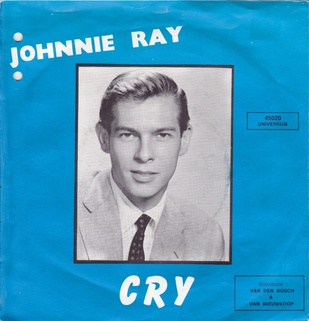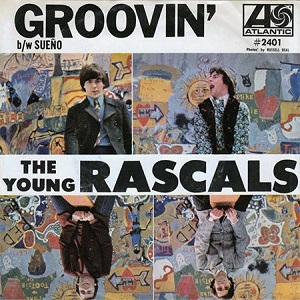Related Research Articles
Flanging is an audio effect produced by mixing two identical signals together, one signal delayed by a small and (usually) gradually changing period, usually smaller than 20 milliseconds. This produces a swept comb filter effect: peaks and notches are produced in the resulting frequency spectrum, related to each other in a linear harmonic series. Varying the time delay causes these to sweep up and down the frequency spectrum. A flanger is an effects unit that creates this effect.
Toni Fisher, also billed on her records as Miss Toni Fisher, was an American pop singer. She was known for her recordings of "The Big Hurt", "West of the Wall", "Maybe ", and "Why Can't The Dark Leave Me Alone". She was later known as Toni F. Monzello following her marriage to Henry Monzello.

"Running Scared" is a song written by Roy Orbison and Joe Melson and sung by Orbison. An operatic rock ballad, the recording of the song was overseen by audio engineer Bill Porter and released as a 45 rpm single by Monument Records in March 1961 and went to number one on the Billboard Hot 100 chart. "Running Scared" also reached No.9 in the UK Singles Chart. It sold over one million copies in the US alone. The song was included on Orbison's 1962 album Crying as the final track on the album.
"You Always Hurt the One You Love" is a pop standard with lyrics by Allan Roberts and music by Doris Fisher. First recorded by the Mills Brothers, whose recording reached the top of the Billboard charts in 1944, it was also a hit for Sammy Kaye in 1945.

"Cry" is a 1951 popular song written by Churchill Kohlman. The song was first recorded by Ruth Casey on the Cadillac label. The biggest hit version was recorded in New York City by Johnnie Ray and The Four Lads on October 16, 1951. Singer Ronnie Dove also had a big hit with the song in 1966.

"Hurts So Good" is a song by American singer-songwriter John Mellencamp, then performing under the stage name "John Cougar". The song was a number two hit on the Billboard Hot 100 for the singer/songwriter. It was the first of three major hit singles from his 1982 album American Fool. The others were "Jack & Diane" and "Hand to Hold On To," which were all released in 1982. The song was also a critical success with Mellencamp, winning the Best Rock Vocal Performance, Male at the 25th Grammy Awards on February 23, 1983.

"Remember (Walking in the Sand)", also known as "Remember", is a song written by George "Shadow" Morton. It originally was recorded by the girl group the Shangri-Las, who had a top five hit with it in 1964. A remake by Aerosmith in 1979 was a minor hit. There have been many other versions of the song as well.

"Heartache Tonight" is a song written by Don Henley, Glenn Frey, Bob Seger and J. D. Souther, recorded by the Eagles and features Glenn Frey on lead vocals. The track was included on their album The Long Run and released as a single in 1979. It reached No. 1 on the U.S. Billboard Hot 100 in November of that year and was certified Platinum by the Recording Industry Association of America representing one million copies sold. It was the Eagles' final chart-topping song on the Hot 100.

"Groovin'" is a song written by American singer songwriters Felix Cavaliere and Eddie Brigati, initially recorded by their group the Young Rascals in 1967. Cavaliere was inspired to compose the song by his girlfriend Adrienne Buccheri, whom he only got to meet every Sunday amidst heavy touring and recording. Musically, the song differs from most of band's previous output, leaving the garage rock genre for Latin American influences, such as baião. Lyrically, "Groovin'" tells the tale of a narrator spending time with his partner on a Sunday afternoon. The song was arranged and recorded at the Talentmasters Studios, New York City in March of 1967.
"Muskrat Love" is a soft rock song written by Willis Alan Ramsey. The song depicts a romantic liaison between two anthropomorphic muskrats named Susie and Sam. It was first recorded in 1972 by Ramsey for his sole album release Willis Alan Ramsey. The song was originally titled "Muskrat Candlelight" referencing the song's opening lyric.
Wayne Shanklin was an American singer, songwriter and producer. His best known compositions were "Jezebel", "Chanson D'Amour ", "Primrose Lane", and "The Big Hurt".
"Love in the First Degree" is a song written by Jim Hurt and Tim DuBois, and recorded by American country music band Alabama. It was released in October 1981 as the third single from the band's album Feels So Right. It became the group's fifth straight No. 1 single on the Billboard magazine Hot Country Singles chart.

"Listen to the Music" is a song recorded by American rock band the Doobie Brothers on their second album, Toulouse Street (1972). The song was the Doobie Brothers' first big hit in 1972. It was written by Tom Johnston. In 1994, it received a remix by Steve Rodway a.k.a. Motiv8 in 1994, which eventually peaked at #37 UK.
"Don't Worry" is a song written and recorded by American country music artist Marty Robbins. It was released in February 1961 as the third single from his compilation album More Greatest Hits. The song was Robbins' seventh number one on the country chart and stayed at number one for ten weeks. The single crossed over to the pop chart and was one of Marty Robbins' most successful crossover songs, peaking at number three on the Hot 100.

"Hurt" is a 1954 song by Jimmie Crane and Al Jacobs. "Hurt" was originally performed by Roy Hamilton, whose version peaked at number eight on the R&B Best Seller chart and spent a total of seven weeks on the chart. A version by Ricky Denell also received considerable radio airplay in 1954 on pop radio stations. The song is considered to be the signature hit of Timi Yuro, whose version went to number four on the Billboard pop chart in 1961. Juice Newton's 1985 version scored number one on Billboard's Country chart.
"West of the Wall" is a 1962 song written by Wayne Shanklin, and was recorded as a single by Toni Fisher. It was recorded at Gold Star Recording Studio, Hollywood.
"Is It Raining at Your House" is a song co-written and recorded by American country music artist Vern Gosdin. It was released in December 1990 as the second single from his compilation album 10 Years of Greatest Hits, but originally appeared on his 1987 album Chiseled in Stone. The song reached number 10 on the Billboard Hot Country Singles & Tracks chart; it was Gosdin's last top 10 and top 40 single on the country charts. Gosdin wrote the song with Dean Dillon and Hank Cochran.
"Making Believe" is a country music song written by Jimmy Work. Kitty Wells recorded a chart-topping version in 1955. The song is on many lists of all-time greatest country music songs and has been covered by scores of artists over the past fifty years, including Thorleifs, Bob Dylan, Johnny Cash, Don Gibson, Roy Acuff, Lefty Frizzell, Wanda Jackson, Connie Francis, Ray Charles, Anita Carter, Dolly Parton, Emmylou Harris, Merle Haggard, Ernest Tubb, Skeeter Davis, The Haden Triplets, Social Distortion and Volbeat. The song is occasionally called "Makin' Believe".
"It Hurts to Be in Love" is a song written by Howard Greenfield and Helen Miller which was a Top Ten hit in 1964 for Gene Pitney. It was one in a long line of successful "Brill Building Sound" hits created by composers and arrangers working in New York City's Brill Building at 1619 Broadway.

Helen Reddy is the second studio album by Australian-American pop singer Helen Reddy, released on November 8, 1971, by Capitol Records. Reddy's selections include tracks by singer-songwriters Carole King, John Lennon, Randy Newman, and Donovan. It debuted on Billboard magazine's Top LP's chart in the issue dated December 4, 1971, and had a seven-week chart run in which it got as high as number 167. On March 29, 2005, the album was released for the first time on compact disc as one of two albums on one CD, the other album being I Don't Know How to Love Him, Reddy's debut LP that originally came out in the spring of 1971.
References
- 1 2 Piano-vocal score (Hollywood, CA: Music Productions, 1959).
- ↑ Pike, Crotus (January 1968). "Sound Effects" (PDF). Beat Instrumental: 17. Retrieved August 16, 2023.
- ↑ Whitburn, Joel (2004). The Billboard Book of Top 40 Hits, 8th Edition (Billboard Publications), page 226.
- ↑ Whitburn, Joel (2004). Top R&B/Hip-Hop Singles: 1942-2004. Record Research. p. 204.
- ↑ "TONI FISHER | full Official Chart History | Official Charts Company". Officialcharts.com. Retrieved 26 April 2021.
- ↑ Whitburn, Joel (2004). Hot Dance/Disco: 1974-2003. Record Research. p. 31.